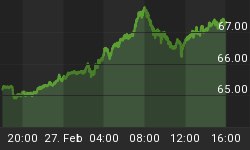Below is an excerpt from a commentary originally posted at www.speculative-investor.com on 19th August, 2010.
Approaching the point of recognition?
US economic data have been deteriorating over the past three months and are likely to deteriorate further over the next three months, but that's not necessarily a problem for the stock market. The stock market always attempts to discount the future, which means that economic weakness is only ever a threat when it hasn't been discounted. This is why the stock market often makes a sustainable up-turn months before the economic data begin to show any signs of improvement. In such cases it isn't so much that the stock market is able to presciently look beyond the current weakness to the brighter days that lie well into the future, it's that a lot of additional economic weakness has already been factored into current stock prices. So, more evidence that the US economy is deteriorating will only be a problem for the stock market if the market is expecting a rosier scenario. Assuming that the economic numbers are going to get worse, the relevant question with regard to the stock market's likely reaction is therefore: howmuch additional economic weakness is the market expecting?
That's a difficult question to answer, because it is only at those times when sentiment indicators reveal extreme optimism or extreme pessimism that the market's short-term expectations are readily apparent. Right now, sentimentindicators are generally in neutral territory.
In conference calls with analysts and investors over the past month, the managements of many large US corporations have been very cautious in their guidance. This has undoubtedly helped to lower the stock market's expectations. There's a big difference, however, from coming around to the belief that future growth will be modest and realising that future growth will be nonexistentor negative.
Our guess is that the market is ready for a period of slow growth, but not for a period of economic contraction. After all, a lot of the talk in the mainstream financial media now revolves around what the Fed can or will do to keep the economic recovery going. There is rarely any acknowledgement of the possibility that the economy has already dipped back into recession or never emerged from the recession of 2007-2009. In general, weakness in the economic data is presented as if it were either an anomaly or restricted to real estate, and there is much discussion about a "jobless recovery" (as if it were actually possible for the economy to make a genuine recovery without bringing about an improvement in the employment scene). We therefore think that if the economic data started pointing to a recession, the stock market would quickly lose atleast 10% of its value.
As noted at the start of this discussion, further deterioration of the economic numbers is likely over the next three months. It is impossible to know if there will be sufficient deterioration to make a critical mass of stock market participants believe that the US economy is in, or headed towards, a recession, but in our opinion the risk of reaching such a point of recognition is high.
The mismatch between interest rates and stock prices
We mentioned above that the stock market could be approaching a point of recognition -- in this instance, the point where the market stops discounting additional recovery and starts discounting recession. The bond market, however, seems to have reached this point a few months ago, which means that there is presently something of an expectation mismatch between the stock and bond markets.
The expectation mismatch is illustrated by the following chart comparison of the NASDAQ100 Index (NDX) and the 5-year T-Note yield (FVX). We included the same chart in the 2nd August Weekly Update to make the point that even though the NDX was rebounding, the continuing decline in the 5-year yield suggested that the stock market's intermediate-term trend was still down. Since then the NDX hasn't done much, but the 5-year yield has stayed on its downward path and is now as low as it was at the recession trough in early 2009.
When inflation expectations are low, interest rates tend to decline in anticipation of economic weakness. So, either the bond market is completely wrong or the stock market will soon make a catch-up move to the downside.

We aren't offering a free trial subscription at this time, but free samples of our work (excerpts from our regular commentaries) can be viewed at: http://www.speculative-investor.com/new/freesamples.html















